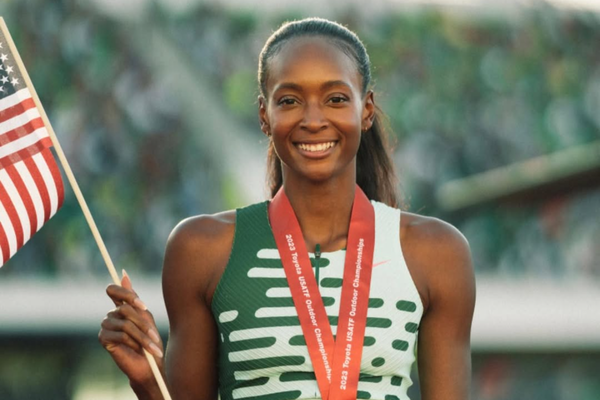
via Imago
Credit: Instagram/Dalilah Muhammad

via Imago
Credit: Instagram/Dalilah Muhammad
At 35, Dalilah Muhammad is making a powerful statement in what she has confirmed will be her farewell season. At the inaugural Grand Slam Track meet in Kingston, Jamaica, she opened her campaign with a strong 54.59-second finish in the 400m hurdles, securing second place behind Sydney McLaughlin-Levrone’s world-leading 52.76. The performance was a testament to Muhammad’s enduring excellence and determination to compete at the highest level.
A trailblazer from Queens, New York, Muhammad has redefined what it means to be a Black Muslim-American woman in track and field. Her decorated career includes Olympic gold in 2016, multiple World Championship titles, and a world record set in 2019. But beyond her medals, Muhammad’s legacy lies in her unwavering faith, quiet leadership, and her role in breaking barriers for future generations. As she enters her final lap around the track, she continues to inspire with grace, grit, and greatness.
ADVERTISEMENT
Article continues below this ad
What is Dalilah Muhammad’s ethnicity?
Straight outta Jamaica, Queens (the New York one, not the island), Dalilah Muhammad is African-American to the core. Her parents, Nadirah and Askia Muhammad, built a home where track meets and Black pride went hand in hand. Askia, a Muslim chaplain and professor, and Nadirah, a child protection guru, made sure she knew her worth long before Nike did.

Queens—a borough buzzing with every culture under the sun—shaped her hustle. By 17, she was dusting rivals at the 2007 World Youth Championships, but her come-up wasn’t all glam. Early on, she raced in discount kicks from Ross Dress for Less because, as she put it, “We made it work.” Nike finally woke up and signed her in 2013, but that Queens grit? That was all her.
“I’m New York tough,” she’s said, laughing about the city’s grind. Her Blackness isn’t just a label—it’s her superpower. She mentors young stars like Anna Cockrell and slams doors open for Black women in a sport that’s still catching up.
What’s your perspective on:
Dalilah Muhammad: A trailblazer or just another athlete? How do you see her legacy?
Have an interesting take?
What is Dalilah Muhammad’s Religion?
Muhammad’s faith is as central to her story as her speed. Raised in a liberal Muslim household, she grew up praying at her father’s mosque in Queens and embracing Islam’s teachings on resilience and community. Unlike fellow Olympian Ibtihaj Muhammad (no relation), Dalilah doesn’t wear a hijab, which kept her faith under the radar even as she won gold in Rio.
“People said I wasn’t the ‘stereotypical Muslim,’” she told The Guardian, pushing back against narrow labels. “We express our faith in different ways.” Her activism speaks volumes. Dalilah Muhammad was featured in Nike’s 2017 “Equality” campaign, which aimed to promote diversity and inclusion in sports and society. The campaign included high-profile athletes such as LeBron James, Serena Williams, and Kevin Durant, and received wide media coverage from outlets like GQ, Teen Vogue, The Cut, and ESPN.
ADVERTISEMENT
Article continues below this ad
Around the same time, Muhammad addressed the impact of the Trump administration’s travel ban in interviews with ESPN and The Guardian, expressing concern over how it affected Muslim-Americans. “I think it’s unfortunate and it kind of makes me a little bit worried, just because we travel so much back and forth out of the country — and having the name Muhammad attached to me — it’s a little scary, almost,” she said.
During the 2024 Olympic Trials, where injuries nearly derailed her, she leaned on her family’s spiritual grounding. “My dad always says our strength comes from Allah,” she shared. Even as debates about gender testing and race swirl in track, Muhammad stays rooted in her beliefs, criticizing invasive policies while advocating for fairness.
With retirement looming after 2025, Muhammad’s final races are must-watch events. She’s eyeing the World Championships in Tokyo this summer, where she’ll defend her 4x400m relay title and chase one last podium in the hurdles. Then there’s the Diamond League circuit, where she’ll pass the baton to next-gen stars like Alexis Holmes.
ADVERTISEMENT
Article continues below this ad
But track’s only part of her legacy. Muhammad’s already pivoting to mentorship, using her voice to amplify Muslim and Black athletes in a sport that often sidelines both. “We have to make the path easier for those coming after us,” she insists.
So, as she laces up for her final laps, remember: Dalilah Muhammad isn’t just racing for gold. She’s sprinting toward a future where culture, faith, and speed collide—and leaving the door wide open for whoever’s next.
ADVERTISEMENT
ADVERTISEMENT
ADVERTISEMENT
ADVERTISEMENT


Dalilah Muhammad: A trailblazer or just another athlete? How do you see her legacy?